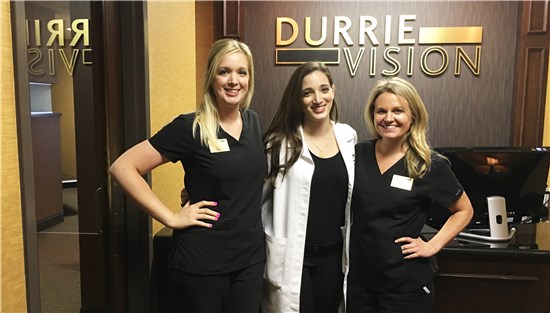By Suzanne LaKamp, OD, FAAO
August 31, 2016
The ability of your office’s doctors and support staff to communicate and work effectively together makes a huge difference in the quality of care you deliver. It is up to every doctor working in a practice, whether partner or associate, to make an effort to get to know support staff, and to build productive working relationships with each.
Good working relationships with support staff is essential because it is these relationships that will enable you to deliver high-quality patient care. We spend a majority of the day with co-workers. Patients are also aware of the practice atmosphere. A nice, amicable group of people makes the day better, and ultimately, improves the patient experience. Taking great care of your employees and team will ultimately take care of the business.
I currently work in an MD-OD private practice with three ophthalmologists and two optometrists. There are six technicians. There are an additional five support staff, including surgical scrubs or surgical counselors, who can fill in as technicians when needed. The support staff are cross-trained in multiple departments, so there is always coverage during unplanned absences. Technician schedules rotate throughout the week. Some technicians will work up patients, while other technicians will serve as scribes for an MD or OD. Technicians work for all of the doctors.

Dr. LaKamp with two members of her practice’s support staff: (on the left) Alice Burrows of the practice’s communications team and Melissa Emerson of the patient counseling team. Dr. LaKamp advises all doctors, whether associate or partner, to make an effort to get to know the support staff. That way you’ll be able to work together as effectively as possible to serve patients.
Take Time to Get to Know Support Staff
When I joined my current practice, I wanted to learn about my co-workers as quickly as possible. Establishing rapport is important to your success as a new employee. I ask a lot of open-ended questions, and discover what I can. It is amazing how much you can learn about someone through questions such as “how is your day going?” or “how was your weekend?”
Ask questions about employees’ interests. Listening is one of the most important skills for building any relationship. Over time, we understand what motivates people. I try to make it a daily goal to always thank an employee for his or her help, and to ask if there is anything I can do to help make his or her day better.
Gauge Staff Satisfaction By Turnover Rate
One of the indicators of a healthy practice is minimal turnover. Happy employees stay. Some degree of turnover is unavoidable due to new job opportunities, relocating closer to loved ones, or leaving for various personal reasons. But turnover is not just disruptive to the office flow, it is costly to a practice. There are many costs in replacing an employee such as advertising for the position, time spent interviewing, time during the on-boarding process and other training costs. It is important to ensure your support staff is as satisfied in their jobs as you are in yours.
Provide Adequate Training
New support staff shadow every department in the practice, from the front desk, to patient consultation, all the way through to surgery. It is important for everyone in the team to know how the practice operates as a whole. Newly hired technicians spend most of their training time with established technicians to learn practice flow, clinic procedures and job responsibilities. The technician will then spend plenty of time for the next phase of training with the OD. The OD reviews the basics of optics, one-on-one training with refraction, and even covers a little about patient management.
Establish Level of Support Needed
The doctors at my practice all like to have support staff in the exam room. Technicians can scribe for the doctor, while the doctor can focus on caring for and educating the patient. Patient care is enhanced when the doctor has full attention on the patient, rather than the computer monitor and EHR. Our practice’s doctors also like when support staff walk the patient between exam rooms, or to the checkout.
Our doctors will walk patients out when technicians and staff are busy. I prefer to work with a technician to document my exam with the patient, and to then have the technician walk the patient to checkout. Rather than spend a few more minutes walking hallways, I am able to see my next patient, and cut down his or her wait time.
Everyone Has to Be Able to Work with Everyone
While there may be preferences for some staff to work with specific doctors over others, it would be wrong to honor those preferences. There is no teaming together some technicians with certain doctors, as that would likely create animosity and hurt feelings. All technicians and doctors work together, and show one another respect. It all starts in the beginning, by hiring staff for good attitude over experience. You cannot train a good attitude, but you can develop experience.
Stay Positive & Avoid Miscommunications
Most difficulties in an office involve miscommunication. In our office, there is rarely any obvious tension because of the strongly positive work culture.The leadership of a practice can inspire positivity, just as easily as it can set a negative foundation for the work place. Leaders should develop company policy based on trust, knowing that the overwhelming majority of employees come to work each day with good intentions. Employees also need to feel cared for. Heavily punitive policies create fear and stress. Secure employees enjoy a more healthy environment, increased productivity, and can have fun with co-workers during the day.
The positivity grows with time. ?After identifying a problem, the team works toward a solution that minimizes impact to the clinic and to the patient. As long as the patient is unaware of any difficulties, the clinic has done well. Any serious issues, or repeat problem behaviors, though, result in termination. These behaviors could include chronic tardiness, lying or any actions which jeopardize patient care.
For instance, if a scribe is running late, the team can switch roles temporarily to help with coverage. A patient counselor who has scribe training can fill in until the other employee arrives. In some situations, covering for another person can be frustrating or create tension. The goal is for the team to function well as a whole, even if it means working a little harder to help each other out as needed. If done correctly, the patient is never aware of these last minute, possibly chaotic changes. Patients should also not hear gripes or see frustration.
Show Appreciation to Support Staff
The OD cannot accomplish most tasks of patient care alone. It takes strong staff to support and take good care of patients. Treat the team well because happy staff take care of patients. A positive patient experience then takes care of the business. Verbal praise to staff is effective when showing appreciation. I also like to bring coffee to employees to show my gratitude. The staff sometimes bring me coffee, too! When post-op clinic is busy on early Saturday mornings, sometimes extra technicians will volunteer to help. Behaviors like these rarely go unnoticed by everyone. Extra helpful staff members are recognized during team meetings. The employees vote for the person who exemplifies the best team work, as well as someone who provides excellent service to our patients. Each month, the person with the most nominations receives a cash bonus.
Doctors Reinforce Standards of Patient Care
The chief operating officer (COO) is directly responsible for recruiting, interviewing and hiring for all employees. The COO enforces clinic policies. Employee doctors can make changes as necessary to clinic protocol, and the COO always supports the medical decisions of the doctor. The COO announces changes to staff directly involved with patients, so that the clinic is aware.The practice’s team leaders, and sometimes the partners, all help in evaluating and interviewing potential candidates. While all of the doctors are considered part of the leadership team, employed, non-partner doctors do not directly contribute to the hiring process for support staff. All of the doctors are, however, responsible for enforcing clinic policies and protocol, specifically those involving technicians and patient care.
I may remind technicians if there is something missing during a patient work-up, but I do not reprimand. I may discuss procedural items regarding patient care, but I never partake in any behavioral discipline. The technician supervisor, who is also the COO, manages discipline and corrective actions. With such a strong team, I fortunately have never had a problem with anyone’s behavior or attitude.
Help Train Support Staff
I have trained numerous technicians about good entrance testing, contact lenses and refraction. The technicians are often curious about patient care and management. Some of the staff also enjoy learning about ocular disease, dry eye and refractive surgical complications. Since the development of the new dry eye clinic of the practice, it has been important to educate the entire team about the reason for its inception, and how the new clinic operates. Important developments can be presented at monthly team meetings using a brief power PowerPoint presentation with visual aids.
See What Your Support Staff Can Teach You
I learn more about the patient through the help of my technicians than I can alone. Technicians spend a good amount of time with the patient, and if astute, can provide valuable information to the doctor. It is helpful to learn more about the patient, beyond simply the acuities and chief complaint, before you walk into the examination room. For example, advance warning that a patient is having a bad day helps me to approach the patient in a different, more strategic manner. Just as every patient is different, you cannot expect each visit with the same patient to be consistent. And that’s where a strong support staff, as in so many other areas, can be invaluable.
Suzanne LaKamp, OD, FAAO, is an associate at Durrie Vision in Overland Park, Kan. To contact: dr.suzanne.lakamp@gmail.com



























